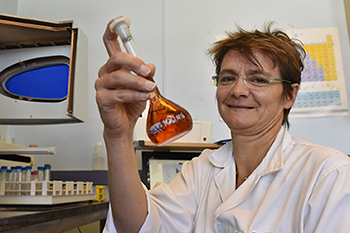Latest News Archive
Please select Category, Year, and then Month to display items
08 May 2024
Photo SUPPLIED

The Dean of the Faculty of Natural and Agricultural Sciences, Prof Paul Oberholster, has the pleasure of inviting you to the inaugural lecture of Prof Dirk Opperman.
Date: 21 May 2024
Time: 17:30
Venue: Equitas
 Click here to RSVP before Wednesday, 15 May 2024. Alternatively, contact Christelle van Rooyen on +27 51 401 9190.
Click here to RSVP before Wednesday, 15 May 2024. Alternatively, contact Christelle van Rooyen on +27 51 401 9190.
About Prof Dirk Opperman
Prof Dirk Opperman obtained his PhD in Biochemistry at the University of the Free State in 2008. This was followed by postdoctoral research on directed evolution with Prof Manfred T Reetz at the Max Planck Institute for Coal Research (Germany). In 2010, he was appointed in the Department of Microbiology and Biochemistry. He subsequently established structural biology at the UFS, and his current research focus lies at the interface of evolutionary and structure-function relationships of biocatalysts, and their application in green chemistry. He is an NRF B-rated researcher with co-authored papers in Science, Nature Communications, and Angewandte Chemie.
His research has been funded by both local and international organisations, ranging from industries such as SASOL to the Global Challenges Research Fund (GCRF, UK). He has a long-standing collaboration with researchers at the Delft University of Technology (TUDelft, the Netherlands) and is currently part of a European Research Area Network Cofund (ERA-NET Cofund) partnership on Food Systems and Climate (FOSC) that develops biocatalysts for upcycling waste.
UFS Ground Studies Laboratory receives accreditation to international standard
2016-03-18

Lore-Mari Deysel, Deputy-Director of the institute for Groundwater Studies.
Photo: Charl Devenish |
The Institute for Groundwater Studies (IGS) Laboratory at the University of the Free State is on equal footing with international testing labs. With its accreditation in March 2016 by SANAS (South African National Accreditation System), the IGS Laboratory now officially meets global standards.
Quality of water
The IGS Laboratory mainly analyses the quality of water samples. When it was originally established in 1989, the lab’s central function was to conduct testing for researchers at the institute itself. “After the public and water boards realised their need to analyse water samples, the IGS Laboratory expanded to deliver a service to these clients,” says Lore-Mari Deysel, Deputy-Director of the institute.
Since suppliers and regulatory authorities will not accept test or calibration results from a lab that is not accredited, the IGS initiated the accreditation process.
Accreditation to international standard
In order to be deemed technically competent and able to receive accreditation, labs must meet the ISO/IEC 17025 standard. ISO/IEC 17025 was first issued in 1999 by the ISO (International Organization for Standardization) and the IEC (International Electrotechnical Commission).According to Deysel, this is the single most important standard for calibration and testing laboratories around the world.
“Laboratories that are accredited to this international standard have demonstrated that they are technically competent and able to produce precise and accurate test and/or calibration data. Furthermore, it demonstrates that the university has the capacity to supply valuable and reliable services alongside the academy,” Deysel says.